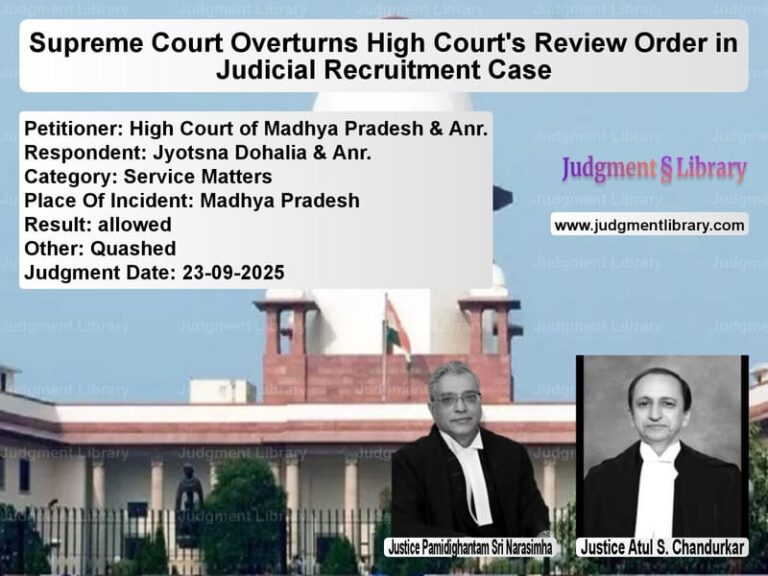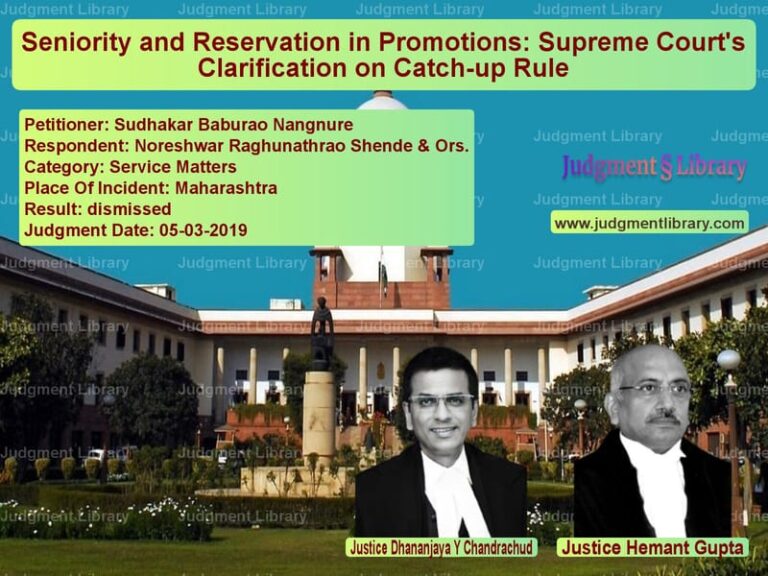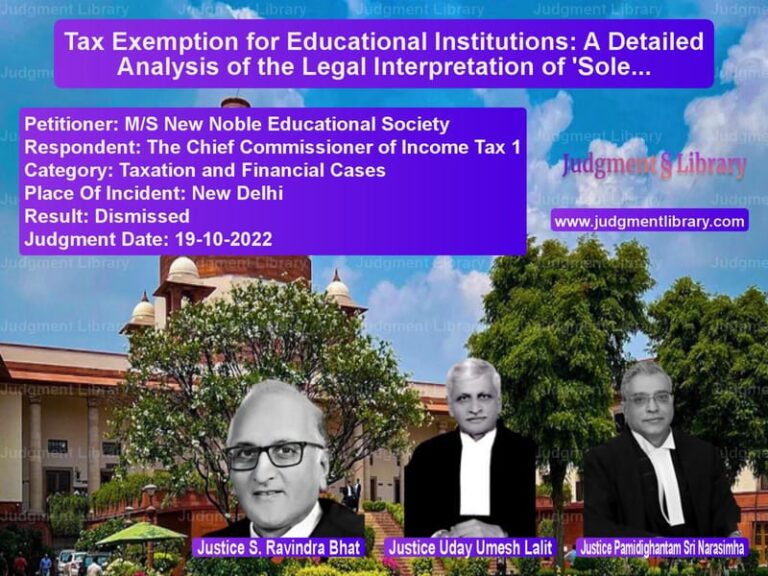Supreme Court Upholds Landlord’s Right to Eviction in Long-Standing Tenant Dispute
The case of Ambika Savaria & Others v. Sanjay Sharma & Others revolved around a dispute over the eviction of tenants occupying a property for over 40 years. The Supreme Court, in its judgment dated August 9, 2016, overturned the Chhattisgarh High Court’s decision and reinstated the eviction order in favor of the landlord. The ruling emphasized the doctrine of tenant’s estoppel and clarified that a tenant cannot dispute the landlord’s ownership after having accepted tenancy.
Background of the Case
The dispute arose when the predecessors of the appellants, Vasudev Shyamji and Govind Shyamji, filed a suit (Civil Suit No. 67-A of 1979) seeking the eviction of Bhanaram Sharma, the predecessor of the respondents, from a house located at House No. 189/1, Ward No. 18, Raigarh. The eviction was sought on the grounds of bona fide need and reconstruction. Bhanaram contested the suit, claiming that the plaintiffs were not the owners of the property and that the question of ownership was irrelevant to an eviction suit.
The Trial Court ruled in favor of the plaintiffs, ordering eviction. The decision was upheld by the Lower Appellate Court. However, the Chhattisgarh High Court reversed both decisions, holding that the plaintiffs had failed to prove ownership, which was a necessary condition for eviction under Section 12(1)(e) of the Chhattisgarh Accommodation Control Act, 1961.
Legal Issues
The Supreme Court was required to examine the following issues:
- Whether a tenant can challenge the ownership of a landlord after acknowledging tenancy.
- Whether the plaintiffs had provided sufficient proof of ownership for eviction under Section 12(1)(e) of the Chhattisgarh Accommodation Control Act, 1961.
- Whether the High Court erred in setting aside the concurrent findings of the Trial Court and Lower Appellate Court.
Petitioner’s Arguments (Ambika Savaria & Others)
The appellants argued:
- The tenant was estopped from challenging ownership under Section 116 of the Indian Evidence Act, which prohibits a tenant from denying the landlord’s title.
- The property was leased by the Nazul Department to the plaintiffs’ predecessors, and rent was paid by the defendant’s predecessor.
- The Trial Court and Lower Appellate Court had already found that the plaintiffs were the owners, and the High Court erred in reassessing the evidence.
- The eviction was justified due to bona fide need and planned reconstruction.
Respondent’s Arguments (Sanjay Sharma & Others)
The respondents contended:
- The plaintiffs had failed to produce valid ownership documents.
- Paying rent to the plaintiffs’ predecessors did not automatically establish ownership.
- The plaintiffs’ father, Shyamji Gangji, was merely a landlord but not the owner.
- The High Court correctly interpreted Section 12(1)(e) of the Chhattisgarh Accommodation Control Act, 1961, which requires ownership proof for eviction.
Supreme Court’s Observations and Ruling
1. Tenant’s Estoppel Prohibits Challenging Landlord’s Title
The Supreme Court emphasized the doctrine of tenant’s estoppel, stating:
“Tenant’s estoppel is statutorily recognized in Section 116 of the Indian Evidence Act, which prohibits a tenant from denying that the landlord had title to the property at the beginning of the tenancy.”
The Court held that once Bhanaram had accepted tenancy and paid rent to the plaintiffs’ father, he and his heirs could not later challenge ownership.
2. High Court Erred in Reassessing Evidence
The Court criticized the High Court for reassessing ownership evidence:
“The High Court overlooked clear admissions made by the defendant in his cross-examination, where he admitted that the lease from the Nazul Department was in the plaintiffs’ names and that he had paid rent to their father.”
Since the lower courts had already assessed the facts, the Supreme Court ruled that the High Court had no reason to interfere.
3. Ownership Was Adequately Proven
The Supreme Court noted that proof of ownership was sufficient for eviction under Section 12(1)(e):
“The plaintiffs had produced evidence showing that the lease from the Nazul Department stood in their names, and the tenant had accepted their authority by paying rent. This was sufficient to establish ownership for the purpose of eviction.”
Thus, the requirement under the Chhattisgarh Accommodation Control Act was satisfied.
4. Eviction Order Reinstated
The Court ruled in favor of the appellants, stating:
“The judgment of the High Court is set aside. The eviction order of the Trial Court and the Lower Appellate Court is restored.”
However, recognizing that the tenants had been in possession for over 40 years, the Court granted them time until August 31, 2017 to vacate, subject to filing an undertaking.
Final Verdict
The Supreme Court allowed the appeal and ruled:
- The Chhattisgarh High Court’s judgment was set aside.
- The eviction order issued by the Trial Court and Lower Appellate Court was restored.
- The respondents were given time until August 31, 2017, to vacate.
- Failure to file an undertaking would permit the appellants to execute the eviction decree immediately.
Key Takeaways
- A tenant cannot dispute ownership after having accepted tenancy and paid rent.
- Courts must respect findings of lower courts unless there is a legal error.
- Eviction under Section 12(1)(e) of the Chhattisgarh Accommodation Control Act requires ownership proof, but tenants cannot use this to delay eviction unjustly.
- Long-standing tenants may be given time to vacate under equitable considerations.
Impact of the Judgment
The ruling had significant implications for tenancy and landlord-tenant disputes in India:
- It reinforced the legal principle that tenants cannot deny the landlord’s ownership after accepting tenancy.
- It clarified that ownership proof for eviction must be considered holistically.
- It prevented tenants from using procedural delays to avoid eviction.
In conclusion, the Supreme Court’s decision in Ambika Savaria v. Sanjay Sharma reaffirmed the rights of landlords to evict tenants under appropriate legal provisions. The ruling upheld the doctrine of tenant’s estoppel, ensuring that tenancy agreements and long-standing legal principles are respected.
Don’t miss out on the full details! Download the complete judgment in PDF format below and gain valuable insights instantly!
Download Judgment: Ambika Savaria & Oth vs Sanjay Sharma & Othe Supreme Court of India Judgment Dated 09-08-2016-1741878461945.pdf
Direct Downlaod Judgment: Direct downlaod this Judgment
See all petitions in Landlord-Tenant Disputes
See all petitions in Judgment by Uday Umesh Lalit
See all petitions in Judgment by C. Nagappan
See all petitions in allowed
See all petitions in Quashed
See all petitions in supreme court of India judgments August 2016
See all petitions in 2016 judgments
See all posts in Civil Cases Category
See all allowed petitions in Civil Cases Category
See all Dismissed petitions in Civil Cases Category
See all partially allowed petitions in Civil Cases Category







